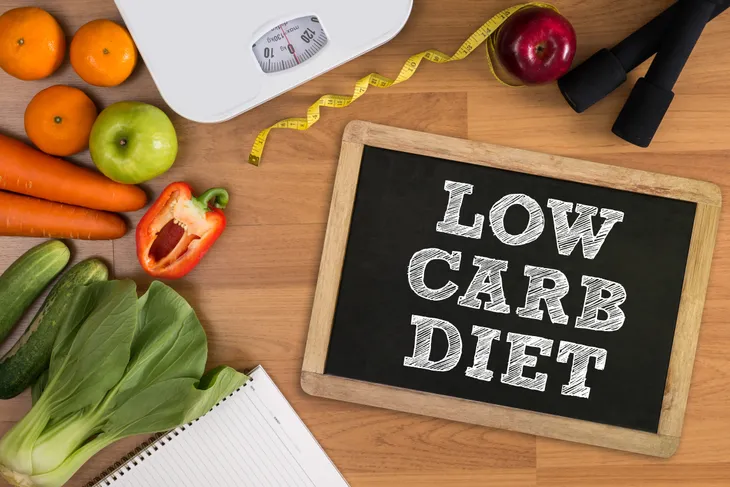In the 1970s, low-carb diets were all the rage. The Dr Atkin’s Diet Revolution book claimed carbohydrate restriction was a “high calorie way to stay thin forever”.
Carbohydrates are found in breads, cereals and other grains, fruit, vegetables and milk. They’re also in ultra-processed fast foods, cakes, chips and soft drinks.
These days, low-carb diets are promoted as a weight-loss solution, to beat heart disease and as better for diabetes. But how do these claims match up with the latest research?
A new review of the evidence found long-term low-carb dieters lost just under a kilo more weight than other dieters. However the review concluded there was no evidence low-carb diets have any additional health benefits.
In fact, if you’re on a low-carb diet, you’ll need to pay closer attention to what you eat to make sure you get enough essential vitamins, minerals, dietary fibre and other phytonutrients.
What did the reviewers investigate?
The Cochrane review included 61 randomised controlled trials (the highest level of evidence) with almost 7,000 adults with excess body weight. About 1,800 had type 2 diabetes. People in the healthy weight range were not included.
The reviewers compared weight-loss diets that varied in carbohydrate content:
- lower carbohydrate diets. This included very low-carb or ketogenic diets (less than 50g of carbs a day or less than 10% of your total energy from carbs) and low-carb diets (50-150g of carbs per a day, or less than 45% of total energy from carbs)
- “balanced” carbohydrate diets (150+ grams of carbs a day, or 45-65% of your total energy from carbs).
What did they find?
The reviewers found that among adults with excess body weight (but who didn’t have type 2 diabetes), those following lower-carb diets for 3-8.5 months lost, on average, one kilogram more weight than those on balanced carb diets.
However, when they ensured restrictions in energy intake were the same in both groups, by providing the food or meal plans, the difference was about half a kilogram.
In longer-term weight-loss interventions lasting one to two years, the average difference in weight-loss between those on low-carb versus balanced carb diets was just under one kilogram.
The average weight lost by groups on any weight-reducing diet varied greatly across the trials from less than one kilogram in some, up to about 13kg in others.
The studies in adults with type 2 diabetes found greater initial weight loss on low-carb diets compared to balanced carb diets: 1.3kg over three to six months. However, in longer interventions that lasted between one to two years, there was no difference.
In the small group of studies that included a maintenance period at the end of the weight-loss intervention, there were no differences in weight-loss in adults either with or without type 2 diabetes.
There were no significant differences in other health measures, including blood pressure, cholesterol, blood sugar control or risk of constipation. And they found no important clinical differences in results based on the extent of participants’ carb restriction.
Overall, the review shows that whether you prefer a lower carb or a balanced carb eating pattern, both can work for weight loss.
Nutrients to monitor on a low-carb diet
Carbohydrate is a macronutrient. Your body uses it to produce energy to fuel your muscles, brain, lungs and other vital processes.
Healthy foods with carbs – breads, cereals and other grains, fruit, vegetables and milk – are packed with other important nutrients, especially dietary fibre, thiamine, calcium and folate.
Without careful planning, a low-carb diet could also be lower in these nutrients. So how can you ensure you’re consuming enough? Here’s what to look out for – and some lower- and higher-carb options.
Dietary fibre is needed to keep your bowel function regular and promote growth of healthy bacteria in your colon.
Lower carb sources: spinach, fresh and frozen mixed berries, almonds, cauliflower
Higher carb sources: wholegrain bread, apples, chick peas, sweet potato.
Thiamin or vitamin B1 is needed to supply energy to your body’s tissues and is used to metabolise carbohydrates.
Lower carb sources: trout, tuna, sunflower seeds, beef, yeast extracts
Higher carb sources: brown rice, black beans, wholemeal bread, yoghurt.
Calcium is needed for strong bones.
Lower cab sources: hard cheese, canned salmon with small bones, almonds, firm tofu
Higher carb sources: yoghurt, milk, soft cheese.
Folate is essential for growth and is used to manufacture DNA, your genetic code. Adequate intakes are especially important for women, as folate is needed to prevent neural tube defects in infants during pregnancy.
Lower carb sources: green leafy vegetables, avocado, broccoli, peanuts
Higher carb sources: wholemeal bread (Australian bread-making flour is fortified with folic acid), fortified wholegrain cereals, brown rice, oranges.
Ultimately, if you love carbs and want to lose weight, you can. Plan to lower your kilojoule and carb intake by not eating ultra-processed, energy-dense, nutrient-poor (junk) foods, while still eating carbohydrates from healthy foods.
![]() If you’d like to learn more about weight loss, you can enroll in our free online course The Science of Weight Loss – Dispelling Diet Myths which begins on February 23.
If you’d like to learn more about weight loss, you can enroll in our free online course The Science of Weight Loss – Dispelling Diet Myths which begins on February 23.
Clare Collins, Laureate Professor in Nutrition and Dietetics, University of Newcastle; Erin Clarke, Postdoctoral Researcher , University of Newcastle, and Rebecca Williams, Postdoctoral Researcher, University of Newcastle
This article is republished from The Conversation under a Creative Commons license. Read the original article.






